Tensions High In Iranian Town As Second Teen In Critical Condition
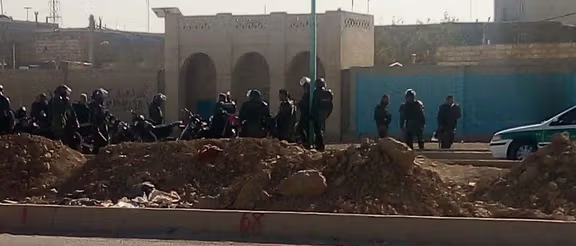
A second teenager injured in a clash between Afghan and Iranian youths in Meybod this week is in a critical condition as calls for the expulsion of illegal Afghans grow.

A second teenager injured in a clash between Afghan and Iranian youths in Meybod this week is in a critical condition as calls for the expulsion of illegal Afghans grow.
After the killing of Amir-Reza Aghaei last Thursday, public demonstrations took place on Friday, as residents of Meybod urged the government to deport Afghan immigrants who have no legal status. Of the 90,000 population in Meybod, around 12,000 are believed to be Afghans.
Two teenagers were stabbed on Thursday and subsequently rushed to hospital. One succumbed to his injuries, and the other, Amirhossein Rahimi, was transferred to a hospital in Yazd for urgent surgery where his condition remains critical.
Speaking to Etemad, Amir-Reza's uncle demanded the harshest punishment for the attackers. ChamaranBaharloui, the prosecutor of Meybod, announced that two suspects have been identified and arrested in connection with the murder case.
The incident adds fuel to the ongoing debate surrounding the Afghan population in Iran, estimated to have possibly reached ten million since the Taliban's takeover of Afghanistan in 2021.
The rapid growth of the Afghan population has sparked controversy, with some media and politicians suggesting that authorities are encouraging the growth, citing concerns about potential threats to national security.
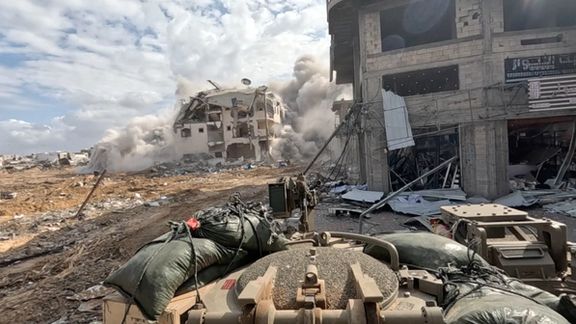
Israel has reiterated its bid to “destroy the Iranian proxy in Gaza” and focus on deterrence against other Iran-backed groups such as Hezbollah.
Israeli government spokesman Eylon Levy told Iran International that the focus of the military offensive is “fighting the terror monsters who perpetrated the October 7 massacre,” not expanding into a regional conflict.
He stressed that in spite of heightening tensions on its northern border with Lebanon, Israel is not interested in fighting a war on two fronts, he added that they have “put up serious deterrence against Hezbollah in the north with a massive buildup of reserves.”
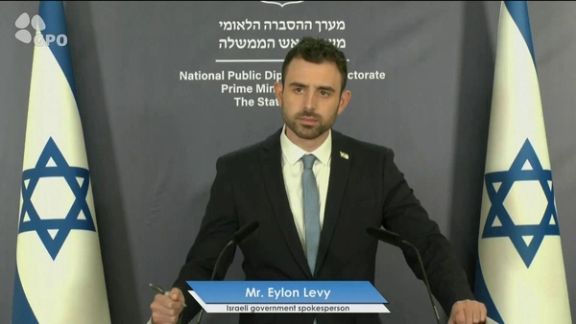
He emphasized that Lebanon’s Hezbollah “will be making the mistake of a lifetime” if it enters war as the consequences will be severe for both the Iran-backed militant group and the poverty-stricken state of Lebanon.
Levy also addressed the rising tensions in the West Bank. “Hamas launched the massacre with a grand vision... to spark a regional conflict,” he said, Hamas “calling on Palestinians in the West Bank to grab guns and knives and join the fighting."
Palestinian sources claim about 240 Palestinians have been killed since the Hamas operation while over 550 terror attacks have been launched by Palestinians, according to the IDF, many waged by Hamas.
Iran claims it did not play any role in the Hamas attacks of October 7 terror attack that triggered the current crisis, in spite of its having supported the militants financially and militarily for years, along with many others around the region from Iraq to Yemen.
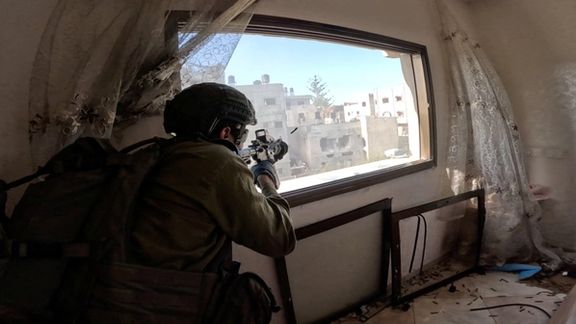
The war, which followed the Hamas invasion on October 7 when thousands of militia killed at least 1,200 mostly civilians and took an additional 240 hostage, has also seen over 15,000 killed in retaliatory attacks in Gaza, with hundreds of thousands displaced. Israel pounded the enclave to uproot the Islamist group, which has made the war exceedingly bloody, hiding deep among the civilian population and in a vast underground tunnel network stretching around 500kms.
Israeli forces have begun operating in the southern area of the Hamas-run Gaza Strip, where the population has been swollen by around one million refugees from northern areas and has faced heavy international pressure, including from Washington, to limit civilian casualties.
"We are going to continue with our campaign to destroy Hamas, a campaign that the United States sees eye to eye with us about the strategic objectives of this war, that this war cannot end with Hamas still standing," Levy said.
"We're moving ahead with the second stage now. A second stage that is going to be difficult militarily," noting that "We didn't pick the battlefield, Hamas picked the battlefield."

Vladimir Putin is set to visit the UAE and Saudi Arabia before hosting the Iranian president in Moscow, hinting at a re-activation of Moscow's Middle East diplomacy.
Kremlin spokesman Dmitry Peskov announced the planned visits of the Russian president on Tuesday, adding that the agenda for Ebrahim Raisi's Moscow visit is not finalized yet but discussions will likely include the Gaza war.
Although not very frequently held, Raisi’s meeting with Putin is not unexpected as Tehran and Moscow are partners in crime, particularly since Iran is supplying Russia with drones and missiles for the invasion of Ukraine.
Putin’s outreach to the Arab states of the Persian Gulf aligns with his broader strategy to foster global alliances outside the Western sphere, aimed at projecting the failure of US and its allies’ attempts to isolate Russia through sanctions. Aligning with the two most powerful Persian Gulf states helps give Putin a degree of credibility more than the allegiance with Iran, as the world views Russia, like Iran, as a rogue state.
The visit comes after OPEC+ agreed to voluntary supply cuts totaling about 2.2 million barrels per day (bpd), including an extension of existing Saudi and Russian voluntary cuts of 1.3 million bpd. Russia cooperates with all three countries in the OPEC+ group of oil producers, which last week announced new voluntary production cuts that were greeted skeptically by the oil market because of doubts as to whether they would be fully implemented.
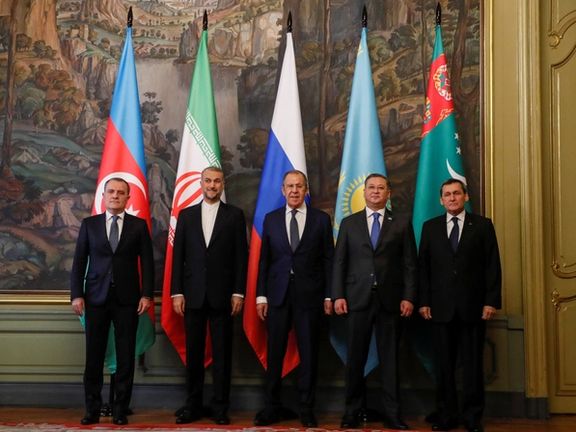
The visits by Putin and Raisi come as Russia is also hosting the littoral countries of the Caspian Sea, in a cooperation framework that Moscow says strengthens security in Eurasia. “The joint work of the Caspian countries makes a significant contribution to ensuring security, stability and sustainable development on the Eurasian continent,” Russian Foreign Minister Sergey Lavrov said in a meeting with his Azerbaijani, Iranian, Kazakh and Turkmen counterparts in Moscow on Tuesday.
Lavrov proposed the creation of “the Caspian Council -- a forum for cooperation and dialogue without any bureaucratic schemes,” emphasizing the need for enhanced international legal foundations and cooperation among Caspian countries. He expressed hope for further collaboration based on the outcomes of the upcoming Third Caspian Economic Forum in Tehran.
The Russian foreign minister also highlighted that deepening practical cooperation across the region is also significant in a broader sense, namely in the context of the formation of a multipolar world order. Last month, hundreds of military leaders, lawmakers, diplomats and scholars convened in Canada’s 2023 Halifax International Security Forum to discuss the alignment of Russia, Iran, China, and North Korea as a substantial threat to the established world order.
Leaders of these countries, including Iran’s ruler Ali Khamenei, have repeatedly talked of a new global order not based on Western values.
It is a rare foreign visit for Putin who now has an ICC arrest warrant on his head for alleged war crimes in Ukraine. While it may limit his travels to most of the world, there remain some who still welcome him.
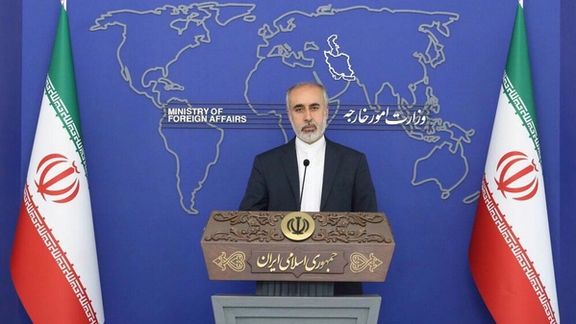
Iran has denied involvement in the recent attacks on vessels in the Red Sea, while its proxy, the Houthi rebels, claimed responsibility.
The Houthis are one of several Iran-backed militant groups in the Middle East. They have been effectively in a state of war with Saudi Arabia since 2015 and have claimed support for Palestinians since the Hamas terror attack on Israel on October 7.
The British government has attributed the drone and missile attacks on commercial ships in the Red Sea to Iran, but Nasser Kanaani, the spokesperson for the Ministry of Foreign Affairs said Tuesday "As we have clearly stated before, resistance groups are not taking orders from Tehran to confront the war crimes and genocide committed by Israel."
The United States, on the other hand, has also placed blame on Iran for a series of attacks in Middle Eastern waters by Houthis. Jake Sullivan, the US national security adviser, asserted in a Monday briefing with reporters that there is "every reason to believe that the attacks, while launched by the Houthis in Yemen, are fully enabled by Iran."
Recently, the Houthis confirmed launching drone and missile attacks on what they claimed were two Israeli vessels, Unity Explorer and Number 9. The attacks, according to the Houthis, were carried out "in response to the Yemeni people's demand and Muslim states' calls to stand with the Palestinian people."
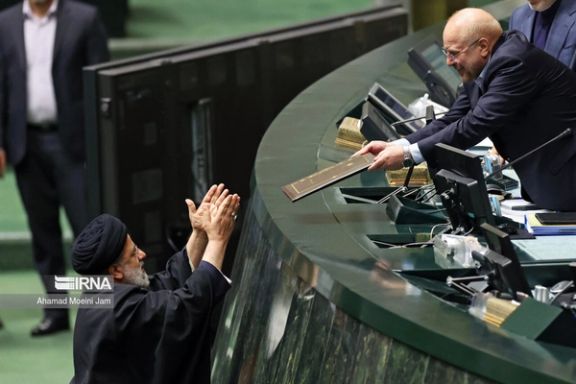
Iranian President Ebrahim Raisi presented the proposed budget for the upcoming year to parliament on Tuesday for a nation amidst an economic crisis.
Despite his claims of a four percent economic growth, observers note a lack of visible signs of development, coupled with high inflation and the depreciation of the national currency.
Defending the budget proposal, President Raisi said efforts were made to "realistically depict both revenues and expenditures." Addressing the parliament, he asserted that his government had experienced a four percent economic growth since taking office, following a decade of economic stagnation. However, his assertions are currently not subject to independent verification due to constraints on government agencies and a lack of transparent quarterly statistics.
Raisi acknowledged a budget deficit of approximately ten billion dollars but claimed that it had been compensated through income generation. Despite facing economic challenges, he expressed the government's commitment to avoiding a budget deficit in the current year.
There are no visible signs of economic development in Iran with international sanctions for the country's nuclear program, its brutal suppression of protests and its support of Russia's war on Ukraine significantly restricting trade, foreign investment, and access to financial markets.
High inflation rates further compound the economic woes, eroding the purchasing power of the local currency. This economic scenario poses challenges for businesses and individuals, impacting living standards and contributing to economic stagnation.
The proposed budget, presented to the parliament, revealed some key details, including tax revenues expected to be twice the government's oil revenues.
Last month, the Entekhab news website in Tehran reported that according to the budget bill, even the monthly incomes of 100 to 140 million rials ($200 to $280) will be subject to a 10 percent tax. Jahan-e-Sanat daily also warned that the Iranian government has counted on “inflation tax” to fill the next year’s budget. The Iranian calendar and fiscal year begins on March 21, 2024.
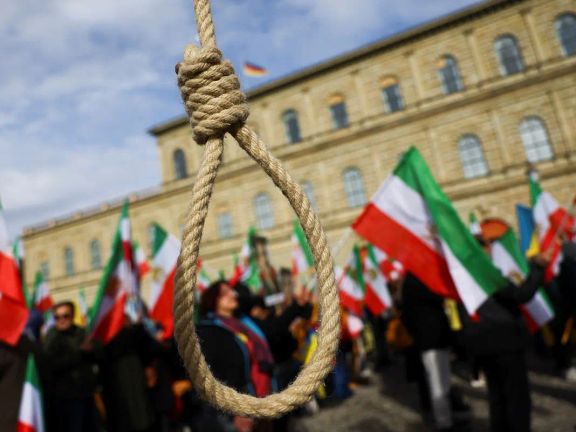
Five prominent French labor unions have condemned the increasing wave of executions in Iran.
In a joint declaration released on Monday, the French Democratic Confederation of Labor (CFDT), General Confederation of Labor (CGT), Unitary Trade Union Federation (FSU), Solidarity trade union, and National Union of Autonomous Trade Unions (UNSA) accused the Iranian government of exploiting global attention on the ongoing conflict in Gaza to intensify its oppressive measures.
The declaration highlighted Iran's response to growing social and popular anger, particularly related to the economic crisis, by escalating repression. This comes amidst authorities increasing arrests of worker activists under false pretexts and targeting individuals who have organized peaceful demonstrations against the high cost of living and salary arrears.
The syndicates emphasized that repression extends beyond worker activists, impacting those expressing opinions contrary to the regime's beliefs, including lawyers, women's rights advocates, and human rights defenders.
Underlining the disproportionate impact on women who have come under increasing pressures to abide by mandatory dress codes and have witnessed state-sanctioned sexual violence in detentions as documented by Iran's Me Too movement, they stated, "Women are the first victims of the authoritarian and patriarchal regime."
The government's heightened execution rates, particularly public ones, were slammed as an attempt to instill fear in the population, putting to death at least 419 people in the first seven months of the year, a rise of 30% since the same period last year, according to the UN.
In a call for international solidarity, they urged all organizations and individuals defending human and workers' rights to protest against the Iranian authorities. Their demands include the abolition of the death penalty, annulment of unjust convictions contrary to fundamental freedoms, and the immediate and unconditional release of activists imprisoned for their opinions or union and association activities, as well as foreign citizens.